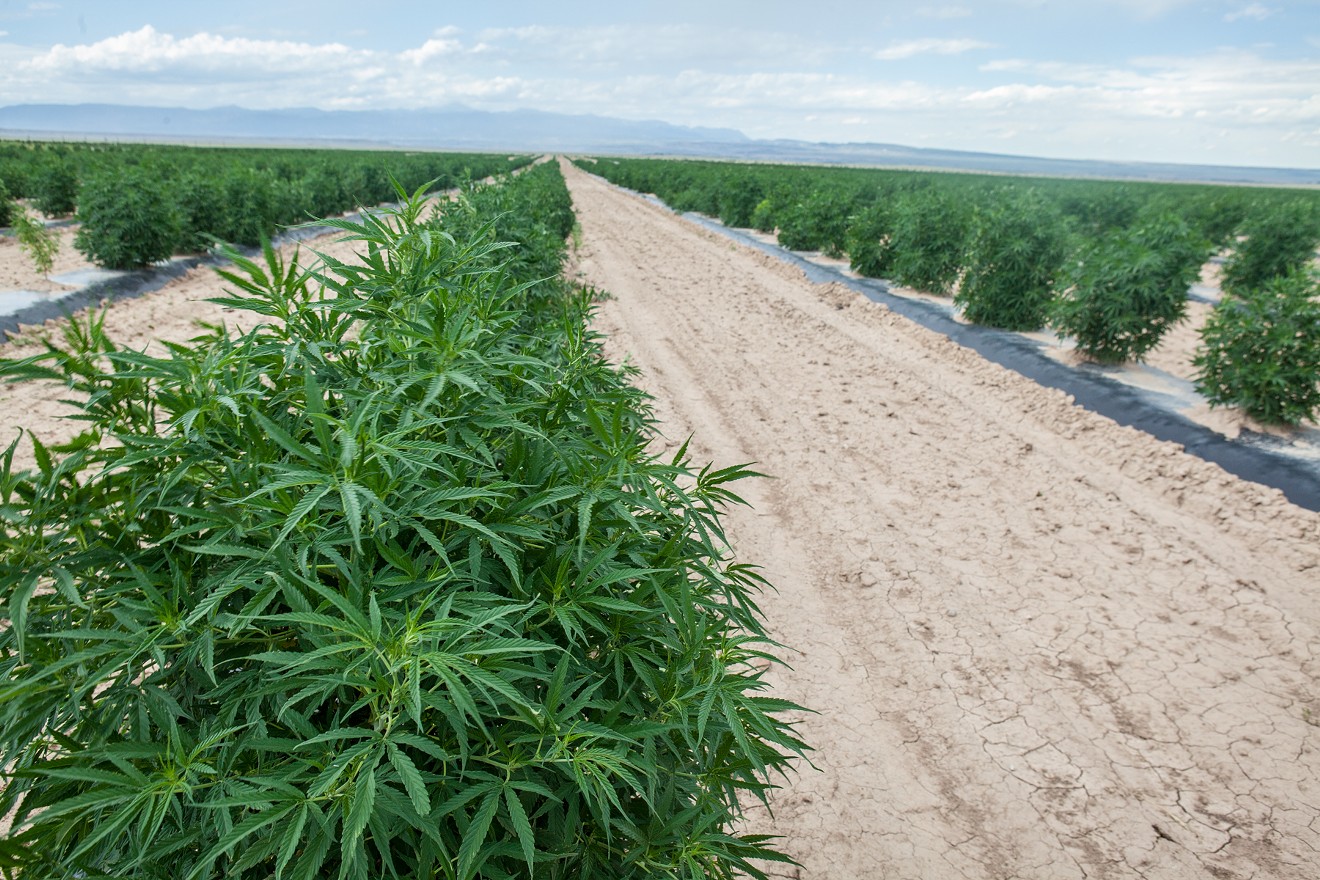Colorado led the nation in land devoted to hemp farming in 2019, according to the state's Department of Agriculture. But local farmers are worried that their growing industry could hit a major obstacle in 2020: the Drug Enforcement Administration.
The 2018 Farm Bill that legalized hemp also put the plant under the federal government's purview. Most of the federal regulations regarding hemp will be enforced by the United States Department of Agriculture, but some oversight responsibilities also fall to the DEA, particularly potency testing.
Any time the DEA gets mentioned in connection with the cannabis plant, people get nervous. Their concerns regarding hemp and the DEA involve simple logistics.
Per the new USDA rules, farmers must have their hemp tested for THC by a laboratory registered with the DEA if they wish to sell it. As of today, January 23, of the forty registered labs across the country, only two are located in Colorado: one in Fort Collins and one in Wheat Ridge. With over eighty square miles of hemp harvested in Colorado last year, farmers wonder if the lack of labs and stricter federal testing requirements will limit or even shut down their operations.
"If there are only two labs that are DEA-compliant, the industry in Colorado is going to fail," predicts Colorado hemp farmer Beau Woodcock. "We all agree that we need regulations, but there is a balance between the government’s regulations and the government’s ability to enforce those regulations in a timely manner to both adhere to the guidelines and make a profit."
The USDA rules, which will be mandated as of November 1 of this year, require every registered hemp field to be tested for THC within fifteen days of harvest; the Colorado Department of Agriculture currently has enough resources to test about 25 percent of Colorado hemp fields. Like other crops, hemp is largely harvested in a two-month period during the fall, which will mean a lot of testing in a short amount of time, according to Denver-based hemp lobbyist Cindy Sovine.
The head of the National Cannabis Industry Association's hemp committee, Sovine has reached out to the federal government with the hemp industry's concerns. It's still unclear as to where all of the hemp will be stored between harvest and testing, she says. And because CBD, the popular non-intoxicating cannabinoid, degrades faster than THC, Sovine worries about heightened risks of hemp testing over the 0.3 percent THC limit in 2020.
"This is a plant, and its properties change. It's harvested at a time when CBD is most potent, but so is everything else. If it's not processed, and it sits, the likelihood is the CBD degrades faster than the THC. What else is left will begin to take a higher hold," she explains. "This will create such a bottleneck in year one, because hemp is going hot. Farmers already took a huge hit this year because of oversaturation in the market."
Anything testing above 0.3 percent THC — known as "hot hemp" among farmers and regulators — must be destroyed under current USDA rules, and anything over 0.5 percent could lead to legal penalties. States with newer hemp programs, such as Arizona, Hawaii and Nebraska, have already struggled with high failure rates, according to the Arizona Republic.
Woodcock, who is also the mayor of Milliken, a town in Weld County, says that all of the uncertainty makes it tough for farmers to plan their crops. "We would have wait times that don’t comply with regulations for pre-harvest testing. We would also have wait times that could affect compliance, due to lab backlogs. This hinders the farmers' ability to plan and commit to contracts with buyers, be compliant due to wait times, and also severely hinders their ability to scale," he explains.
The state's hemp industry is right to be concerned about some of the new rules and potential bottlenecks, says attorney Corey Cox, who represents hemp-industry clients for Denver-based law firm Vicente Sederberg. However, he notes, there's a chance there could be more DEA-registered labs in Colorado than just those listed by the USDA.
"These labs may have potential large amounts of controlled substances on site. They don't make that information public," he says, adding that labs testing hemp can make their information public if they wish. "Given the USDA has essentially provided free advertising, I can't see why someone wouldn't want to do the same."
Cox says he's hopeful that the USDA's rules will be tweaked during the further rulemaking.
State departments of agriculture are allowed to submit their own plans to the feds this year, and the Colorado Department of Agriculture is expected to send one to the USDA within the next several weeks. Members of the hemp and CBD industries, including farmers, are all eager to see what the USDA and DEA allow in Colorado, and testing requirements will be at the top of the list.
"I think the fact the USDA is trying so hard to identify these labs and make them available to the public is telling by itself," Cox says.

Audio By Carbonatix
[
{
"name": "Air - MediumRectangle - Inline Content - Mobile Display Size",
"component": "12017618",
"insertPoint": "2",
"requiredCountToDisplay": "2",
"watchElement": ".fdn-content-body",
"astAdList": [
{
"adType": "rectangle",
"displayTargets": "mobile"
}
]
},{
"name": "Editor Picks",
"component": "17242653",
"insertPoint": "4",
"requiredCountToDisplay": "1",
"watchElement": ".fdn-content-body",
"astAdList": [
{
"adType": "rectangleLeft",
"displayTargets": "desktop|tablet"
},{
"adType": "rectangleRight",
"displayTargets": "desktop|tablet|mobile"
}
]
},{
"name": "Inline Links",
"component": "18838239",
"insertPoint": "8th",
"startingPoint": 8,
"requiredCountToDisplay": "7",
"maxInsertions": 25
},{
"name": "Air - MediumRectangle - Combo - Inline Content",
"component": "17261320",
"insertPoint": "8th",
"startingPoint": 8,
"requiredCountToDisplay": "7",
"maxInsertions": 25,
"watchElement": ".fdn-content-body",
"astAdList": [
{
"adType": "rectangleLeft",
"displayTargets": "desktop|tablet"
},{
"adType": "rectangleRight",
"displayTargets": "desktop|tablet|mobile"
}
]
},{
"name": "Inline Links",
"component": "18838239",
"insertPoint": "8th",
"startingPoint": 12,
"requiredCountToDisplay": "11",
"maxInsertions": 25
},{
"name": "Air - Leaderboard Tower - Combo - Inline Content",
"component": "17261321",
"insertPoint": "8th",
"startingPoint": 12,
"requiredCountToDisplay": "11",
"maxInsertions": 25,
"watchElement": ".fdn-content-body",
"astAdList": [
{
"adType": "leaderboardInlineContent",
"displayTargets": "desktop|tablet"
},{
"adType": "tower",
"displayTargets": "mobile"
}
]
}
]












